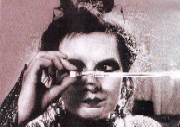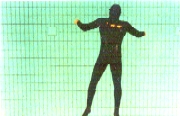This year's Oberhausen International Short Film Festival, the forty-sixth in the series, was marked by a striking increase in the number and quality of innovative films and was rewarded with yet another increase in attendance.
German films were particularly well represented in the festival's five competitive categories, likely owing considerably to the German government's support of the industry. The impact of institutional grants and funding from television production facilities was evident in an increase in the quality over last year's entries. This should, over time, give German short films a higher international profile - particularly if talks at Oberhausen this year on the establishment of a foundation to promote short films should bear fruit.
Nestled in the middle of the city's open-air pedestrian café zone, Oberhausen again proved to be an exceptionally pleasant venue for a festival that showcased an impressive array of talented filmmakers.
Some six films were showcased in the Deutscher Wettbewerb I (German Competition 1) category, all very loosely connected by the theme of Räume (spaces).
Phoenix Tapes (1999) by Christoph Giradet and Matthias Müller was completed under a commission from Oxford's Museum of Modern Art for an exhibition on the works of Alfred Hitchcock. In what can only be described as the cinematic equivalent of sampling, the directors stitched together scenes from some 40 of the American suspense director's works. The chosen excerpts are grouped together by theme, with each section broken by title screens. While an interesting retrospective of the director's work, Phoenix Tapes is a little long -at 45 minutes- for those without a strong interest in Hitchcock's work.
The "sampling" theme continued through Claudia Vonend's six minute short 24 Good Byes (1999), a brilliant bare-bones treatment of American stereotypes that, sadly, did not meet with the audience's approval.
Organised around popular images of the United States, the real magic of 24 Good Byes is in the use Vonend made of an answering machine tape she found in an American junk shop. Throughout the film, strong stereotypical images are combined with excerpts from the tape in a way that leaves the audience to "fill in the gaps" about the person who once owned the tape. Reminiscent of reading a script without all the padding of a novel, Vonend's film shines through her use of aural oddities on the tape such as "You can yank me, you can crank me, if you don't get up in the morning you can thank me!"
While the audience was largely left feeling lukewarm about 24 Good Byes, and a critic from the Hamburger Abendblatt noted the language was "incomprehensible," viewers with a solid grasp of American English and idiosyncrasies are sure to delight in this novel, entertaining short.
Würfel's Stein (1999), by Lutz Garmsen and Ursula Helfer, opens in a style reminiscent of the effect created through angle poise lamps in Pixar's Toy Story. The similarities end there, though, as the film abruptly cuts to dark, Chaplin-esque imagery that innovatively combines animation with live actors. The 15 minute film touches on apocalyptic themes through a magician and his aide working in a lab, the two overlords of a futuristic, automated world that consists of white cube houses in which people are served even their meals by their television sets.
 |
| Theatrical but plotless |
Coming in eight minutes in length, Carolin Schmitz's 4 min 3 sec (1999) is six minutes too long. The documentary focuses on the sport of "static diving," in which the goal is for the participants to hold their breath underwater for as long as possible. The theme may keep an audience interested for a couple of minutes, but after four or five I found myself clinging on to the "excitement" of an occasionally interesting camera angle.
 |
| 4 min 3 sec : 6 mins too long |
Wojtek Wawszczyk's computer animated short Headless (1999) is pleasing to the eye, clever, humorous and also slightly pathetic, though only in the familiar emotions it evokes. Despite the digital animation, Headless retains the timeless appeal of hand-drawn animation, which it combines with a touching (if predictable) plot.
The film begins with a protagonist who has lost his head but not his ability to cope with life without it. As annoyances mount, such as not being able to brush his teeth, he sets out on a quest for a replacement, trying in turn a lamp and a flowerpot. Both are ultimately unsatisfactory, yet the Headless wonder finally settles on a perfectly functional "funny-faced" balloon that is also the object of a sad little girl's affections. In predictable fairy tale style, the protagonist eventually parts with his air-filled replacement head, but the film still left audience members with a happy, sappy smile. Headless is five minutes well spent.
The final entry in Deutscher Wettbewerb I was Carsten Gebhardt's 13 minute Mittwoch (1999), a stylish but cold exploration of a couple's sexuality. The film opens with a young couple in bed, together but alone as the man seemingly sleeps while the woman masturbates at his side. Her self-gratification over, the couple prepares for an evening out with a distinct lack of affection and interest for and in one another. The issue of the woman's sexual expression continues at their night club destination, as here she spends the evening in the washroom, staring deeply, languidly at herself in the mirror, leaving the audience with the impression that here, too, she is having a solo sexual experience. As the film draws to a close, though, the viewer is left more than a little unfulfilled as, perhaps, was the female protagonist - through long focus on her eyes, the audience is left begging to know more about her.
The category was decidedly marked by the experimental films, which told more interesting and coherent stories than those relied on more conventional film techniques. While the films, by and large, delighted reviewers and audience members alike, the theme of Räume was perhaps a little too loose to give the category overall coherence. Space was, in fact, the only element that roughly connected these six shorts in format, theme or style. While a split in the category to group animated films apart from those using live actors may have added some coherence, this category at Oberhausen was an overall delight.
Elke de Wit, 29 May 2000
Moving on:
- Return to the CER front page
- For more articles on Central and East European film see the Kinoeye Archive
- ...particularly its German page


